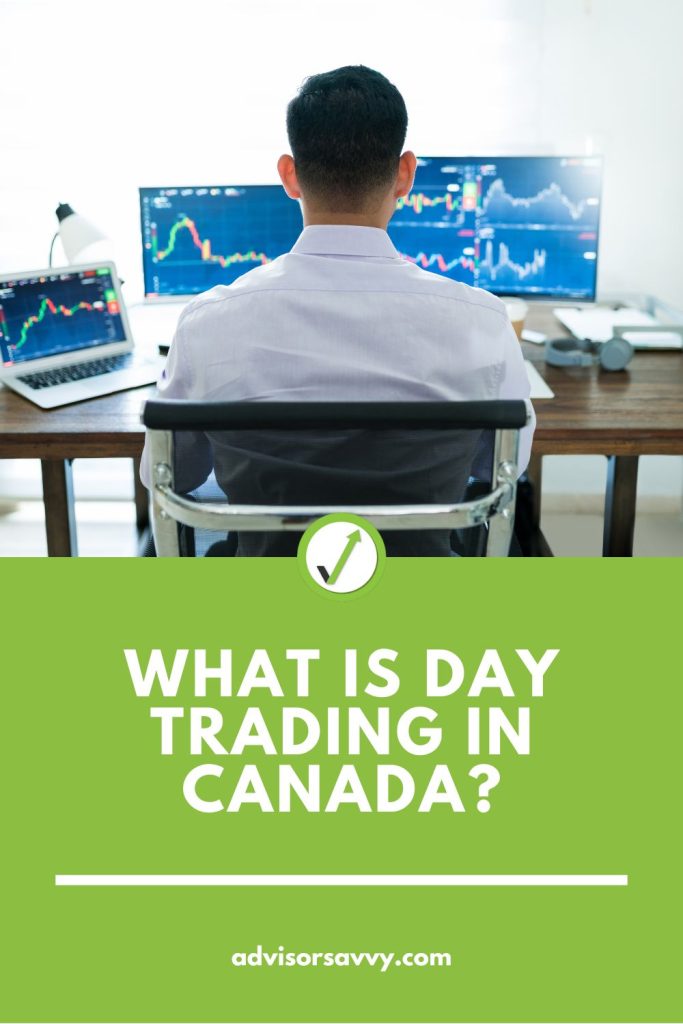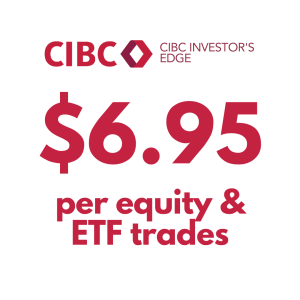
Day trading in Canada is an investment practice that involves an investor buying and selling shares and other securities within the span of one day. The objective is to purchase a security for one price and sell it at a higher price to make an incremental profit. Over time, all these incremental profits add up to produce significant income. There is potential to earn a lot from this practice, especially with low trading fees on online discount brokerages. In addition to profit potential, many investors enjoy the lifestyle of day trading because the hours are limited to the market and you can work from home. Over the years, this has made day trading more popular in the investing world.

Table of contents
While day trading may be a lucrative business for some, it can be a waste of time and money for others. In this article, we’ll be defining day trading in Canada, how it works, and how to get started. Keep reading to learn more!
CIBC Investor’s Line Offer
Up to $6.95 per online stock or ETF trade. Plus, there’s no minimum account balance.
What is day trading in Canada?
Day trading in Canada is the process of buying and selling stocks within a short period of time, typically a day, to generate profit. This is quite different from traditional investing where one leaves money within an investment vehicle for long periods of time, often many years. In some cases, day traders buy and sell investment assets within a few hours.
Day trading has become a popular way to make money for both individuals and professional business managers. Because the investment market changes from hour to hour, or even minute to minute, day trading can be more lucrative than making a traditional investment. Although there are many different terms, day trading is often referred to intraday trading as well.
Interestingly, day trading has become possible in the modern world due to financial technology advancements. Before we had online trading platforms, an investor had to go to the bank and fill out paperwork to purchase stock or other investments. The transaction to purchase an investment would take several days to process, so day trading was virtually impossible. But in the modern age, we have access to real time market data and the ability to process transactions in seconds which makes day trading possible.
Related Reading: ETFs vs Mutual Funds: Which is Better?
How much do day traders make in Canada?
The average annual salary for day traders in Canada is $97,440. In terms of a pay range, the starting point is about $64,000 and on the high end it can be up to $163,000. However, the main question becomes, is it possible for you to make this much in a year? The answer depends on several factors.
Day trading is a complicated endeavor. It requires knowledge on how financial and stock markets work. Even with that knowledge, day traders spend significant time researching markets and applying knowledge before they action trades. If you aren’t well versed in finance or numbers aren’t your thing, you might struggle to make a living for yourself as a day trader.
In addition, day traders require an upfront investment to get started. You can’t buy and sell stocks and other securities without start up capital. But of course, there is a risk that you will lose your upfront investment as you get started and learn the tricks of the trade.
Related Reading: What is the average annual income in Canada?
How does day trading work in Canada?
Day trading is about taking control of the fluctuations of financial markets within a day. As a trader, you may buy a stock in bulk and a small change in the price of one share could generate a major profit. Day traders use various strategies and techniques to maximize short-term gains. They often use technical analysis and charting tools to identify potentially lucrative trades and make decisions based on real-time market data.
Due to its high-risk nature, day trading requires a significant amount of research and discipline. It can be easy to become emotional or impulsive in your decision making when day trading. You might like a particular company and want to believe the price will skyrocket instantly. However, after your purchase, this may not happen, resulting in no profit. For this reason, many day traders develop tactics to remain objective when making trading decisions.
CIBC Investor’s Line Offer
Up to $6.95 per online stock or ETF trade. Plus, there’s no minimum account balance.
To gain more knowledge on a particular stock’s price, investors go through certain news stories, press releases, and announcements. Much of the process is about understanding the greater world around us and how it influences global financial markets. Others may pay more attention to price movements when the market opens, and then make informed decisions.
What account to use for day trading in Canada?
It is advisable to open a non-registered trading account with one of the best online brokerages in Canada. Qtrade is a good Canadian day trading platform for customer support, which is best for beginners. Interactive Brokers is best for more experienced traders. They are worth considering when you have gone far in the trading business and want more features with your account. You might also consider Questrade or Wealthsimple.
According to the Canada Revenue Agency (CRA), day trading is considered a self-employment or business activity. For this reason, day trading in a RRSP, TFSA or other registered account is not allowed. These accounts are designed and meant for personal use, not business or employment activities. Even though it can be tempting to day trade in a registered account to take advantage of the tax benefits, it can flag a CRA audit and result in penalties or fines.
Related Reading: What is Cryptocurrency? A Beginner’s Guide
Is day trading legal in Canada?
Yes, it is. Day trading is not only popular but also legal in Canada. Per the CRA, it is a legitimate source of income for investors.
However, there are some legal requirements you need to be aware of and comply with. First, you should ensure your brokerage firm is regulated by the Investment Industry Regulatory Organization of Canada (IIROC). Next, you will need to record your gains, losses and expenditures related to your day trading activities. This information will be used to report income to the CRA and file your tax return. If you’re self-employed, you will report it on your personal tax return. If you’re self-incorporated, you will report it on your corporate tax return.
Related Reading: Sole Proprietorship vs Incorporation: Which is better?
Is day trading self-employment in Canada?
Yes, it is. According to the Canada Revenue Agency, your day trading earnings is considered self-employment or business income. This is because successful day trading requires active, daily effort to produce income. On the contrary, passive investing activities yields investment income which is taxed differently than self employment or business income.
How is day trading taxed in Canada?
If you are a self-employed day trader, then you will be taxed at a marginal rate based on the total annual income you earn and where you reside in Canada. Ultimately, the more money you make, the more tax you pay.
Fortunately, as a self-employed individual, you can take advantage of special tax deductions. Specifically as a day trader, you can also deduct your trading losses from your income since they are a direct cost of business. For this reason, it’s important to track your gains, losses and expenses related to your day trading activities throughout the year. It will make tax season much easier.
If you decide to incorporate your day trading activities, you will pay corporate tax instead of personal tax. When you start earning a higher income as a day trader, it can be worthwhile to incorporate. The same financial data is required to file your taxes, just the taxation rates and process will be different.
How to Start Day Trading in Canada
If you want to learn how to start day trading in Canada to make money, here are a few major steps to follow:
1. Plan Your Approach
Becoming a day trader is essentially like starting your own business. Before launching a business, there is some planning and consideration involved. As a day trader, most of your work will be done during market trading hours, especially if you plan to day trade stocks. This is pretty similar to a 9 to 5 job. If you want to trade other investments like futures and options, your work may be open to other possibilities and hours.
Day trading as a major source of income is highly risky, especially for beginners. It will require you to build and hold an emergency fund account with enough liquidity to pay for basic expenses if things go awry. As a full-time career, it requires a high-risk tolerance and the ability to make decisions without any external influence.
Without commitment in day trading, it may be difficult to achieve long-term success. This is especially true if you don’t have a background in finance. There are other professional traders, career day traders, asset managers, and players in the open market. Always take into account the costs of day trading and the level of competition involved.
CIBC Investor’s Line Offer
Up to $6.95 per online stock or ETF trade. Plus, there’s no minimum account balance.
2. Choose the Right Brokerage Account
It’s best to trade with a non-registered investment account to avoid tax issues, especially if you are day trading full-time. When selecting a brokerage account, look for a discount brokerage that is best for your day trading needs and affordable. Some of the factors to consider include the complexity of the trading platform, user friendliness, low commissions, and live price reporting.
Once you have an account opened, it’s time to fund your account. Decide how much start up capital you’re willing to invest. Remember, day trading can be risky and you may lose everything you put into the account. Make sure you don’t put all your eggs in one basket!
There is no minimum amount required to start day trading in Canada. However, the type of trading market you choose can determine the amount you can start with. For instance, if you are trading in Forex it will usually requires a minimum of 1,000 units of the foreign currency you are trading.
Related Reading: The Best All in One ETF Investments
3. Build a Solid Strategy
Once you have a good trading account, it’s time to create a solid strategy that will help you earn money. The basic principle of trading is to buy low and sell high to make a profit. Stocks are the perfect example of investment to buy and sell as a day trader. Other assets like futures and commodities, may be considered but will involve more risk. Your strategy will evolve over time as you learn, but it’s important to have a baseline starting point.
4. Keep a Journal to Refine Your Approach
If you want to refine your approach and maintain success, you need to keep track of every trade you make. Journaling keeps track of the following details:
- The type of trading investment
- The indicators used
- The gain or loss as a percentage (return on investment)
- The time the investment was bought and sold
Keeping a journal also keeps you accountable and helps you stick to your plan. When you analyze your trades, you can identify mistakes in your approach and make the necessary adjustments.
How hard is it to day trade?
Day trading in Canada can be challenging for beginners, especially those who don’t have a well-planned strategy or related work experience in the field. It isn’t the best career choice for everyone but if you are interested in finance and investment, it may just be something to consider. Ultimately, any skill is difficult to learn at a high level, so focus on your interests when choosing a career move.
Even if you are a great investor, it’s unlikely that you will be able to chart and time the market correctly over the long run. If you earn profits as a day trader, you have to consider the taxes and fees involved. Both taxes and fees can limit the amount of money you earn as a day trader.
If day trading is your major source of income, you may experience a lot of deductions in your sole proprietorship business. So, the more organized you are, the more you can save on your taxes. However, if you are unsure where or when to start, a financial advisor can help guide you through what you need.
Read More: How To Invest In Stocks

